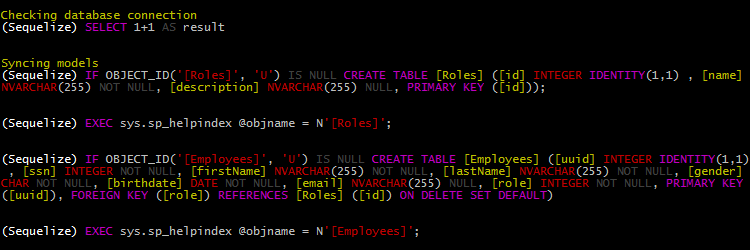Igniculus
SQL Syntax Highlighter and Logger. Unadorned and customizable.




Install
$ npm install igniculus
Usage
const igniculus = require('igniculus')();
igniculus('SELECT [port] AS Printer, \'on fire\' AS Status ' +
'FROM [Printers] P ' +
'WHERE P."online" AND P."check"');

Logger
A reference to the log function is returned on initialization but can be accesed anywhere through .log
const igniculus = require('igniculus');
const options = { ... };
igniculus(options);
const igniculus = require('igniculus');
let query = 'SELECT ...';
igniculus.log(query);
Options
A default color scheme is provided. However, you can define the highlight style for each rule when instantiating:
const igniculus = require('igniculus');
const options = {
constants: { mode: 'inverse', fg: 'red', bg: 'white' },
standardKeywords: { mode: 'bold', fg: 'black' },
lesserKeywords: { mode: 'bold', fg: 'black' },
prefix: { mode: 'bold', fg: 'white', text: '(query) '}
};
const illumine = igniculus(options);
illumine('SELECT * FROM Student s ' +
'WHERE s.programme = \'IT\' AND EXISTS (' +
'SELECT * FROM Enrolled e ' +
'JOIN Class c ON c.code = e.code ' +
'JOIN Tutor t ON t.tid = c.tid ' +
'WHERE e.sid = s.sid AND t.name LIKE \'%Hoffman\')');

The options argument is optional and each property should be one of the following.
Rules
- options.constants - Values surrounded by single quotes. E.g:
'static' - options.numbers - Numeric values. E.g:
2.5 - options.operators - Arithmetic, Bitwise and Comparison operators. E.g:
+ or >= - options.delimitedIdentifiers - Text between brackets or double quotes. E.g:
[Employee] or "salary" - options.dataTypes - One of the included data types. E.g:
INTEGER or VARCHAR
- dataTypes.types - Array of custom data types. Replaces the ones by default. E.g:
['SERIAL', 'TIMESTAMP']
- options.standardKeywords - One the included keywords. E.g:
SELECT or CONSTRAINT
- standardKeywords.keywords - Array of custom standard keywords. Replaces the ones by default. E.g:
['CLUSTER', 'NATURAL']
- options.lesserKeywords - One of the included lesser keywords. E.g:
ANY, AVG or DESC
- lesserKeywords.keywords - Array of custom lesser keywords. Replaces the ones by default. E.g:
['VOLATILE', 'ASYMMETRIC']
- options.prefix
- prefix.text - A prefix can be appended to every log through this option. This prefix can be styled like any previous options.
- prefix.replace - Also, a string or regular expression can be provided and it will replace (if a prefix.text was given) or remove a prefix that matches such parameter. E.g: Sequelize prefixes every SQL statement with
Executing (default): This is removed by default by the option prefix: { replace: /.*?: / }
- options.postfix
- postfix.text - A postfix can be appended to every log through this option. This postfix can be styled like any previous options.
If defined, the options argument takes precedence over default options. If a rule or it´s style is missing it won't be applied. This allows to "enable" or "disable" certain syntax highlighting as you see fit. (Examples below)
A word on types and keywords
Most often, highlighting every reserved keyword can make syntax difficult to read, defeating the purpose altogether. Therefore, three distinct rules are provided: dataTypes, standardKeywords and lesserKeywords.
Each of these rules can be customized individually and come with a predefined list of most widely used T-SQL and SQL-92 keywords and data types. Furthermore each of this lists can be customized as described above.
Styles
All of the previous rule styles can be defined like this:
const options = {
constants: {
mode: 'inverse',
fg: 'red',
bg: 'white'
},
...
};
Each style having an optional:
- style.mode - Modifier. E.g:
'bold' - style.fg - Foreground text color. E.g:
'red' - style.bg - Background color. E.g:
'black'
These can be one of the following.
Modifiers
resetbolddimitalicunderlineblinkinversehiddenstrikethrough
Colors (Foreground and Background)
blackredgreenyellowbluemagentacyanwhite
Examples
const defaults = {
constants: { mode: 'dim', fg: 'red' },
delimitedIdentifiers: { mode: 'dim', fg: 'yellow' },
dataTypes: { mode: 'dim', fg: 'green' },
standardKeywords: { mode: 'dim', fg: 'cyan' },
lesserKeywords: { mode: 'bold', fg: 'black' },
prefix: { replace: /.*?: / }
};

const igniculus = require('igniculus')(
{
constants: { mode: 'bold', fg: 'yellow' },
numbers: { mode: 'bold', fg: 'magenta' },
delimitedIdentifiers: { mode: 'bold', fg: 'red' },
standardKeywords: { mode: 'bold', fg: 'blue' }
}
);
igniculus("INSERT INTO [Printers] ([port], [name], [ready], [online], [check]) " +
"VALUES ('lp0', 'Bob Marley', 0, 1, 1)");

const igniculus = require('igniculus');
const options = {
delimitedIdentifiers: {
fg: 'yellow'
},
dataTypes: {
fg: 'magenta',
types: ['VARBINARY']
},
standardKeywords: {
fg: 'red',
keywords: ['CREATE', 'PRIMARY', 'KEY']
},
lesserKeywords: {
mode: 'bold',
fg: 'black',
keywords: ['TABLE', 'NOT', 'NULL']
},
prefix: {
text: '\n'
}
};
igniculus(options);
igniculus.log('CREATE TABLE User (' +
'[username] VARCHAR(20) NOT NULL, ' +
'[password] BINARY(64) NOT NULL, ' +
'[avatar] VARBINARY(MAX), PRIMARY KEY ([username]))');

Integration
Igniculus' logger is a drop in replacement on any tool that passes the log function either a string or Object paramater. In the latest case the toString() method will be called to obtain a string primitive.
Sequelize
Using igniculus with sequelize is straightforward.
const Sequelize = require('sequelize');
const igniculus = require('igniculus')();
const sequelize = new Sequelize('database', 'username', 'password', {
logging: igniculus
});
const Sequelize = require('sequelize');
const igniculus = require('igniculus')(
{
constants: { fg: 'red' },
delimitedIdentifiers: { fg: 'yellow' },
dataTypes: { fg: 'red' },
standardKeywords: { fg: 'magenta' },
lesserKeywords: { mode: 'bold', fg: 'black' },
prefix: {
mode: 'bold',
fg: 'white',
replace: /.*?:/,
text: '(Sequelize)'
},
postfix: { text:'\r\n' }
}
);
const sequelize = new Sequelize('database', 'username', 'password', {
logging: igniculus
});
...
sequelize.sync({ logging: igniculus});
Before

After

Future Upgrades
- Custom rules
- Selecting log stream E.g:
process.stdout
Maintainers
License
MIT














